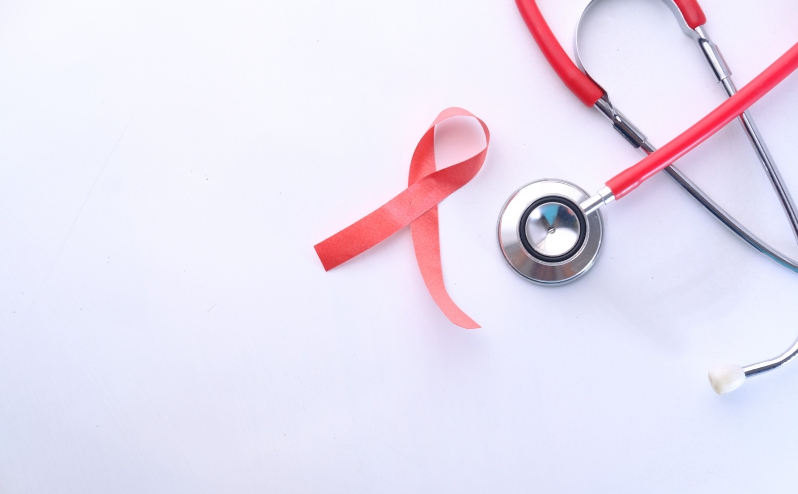
Scholar argues that HIV criminalization laws should be replaced with public health policies.
Eight states criminalize the act of exposing another person to HIV through spitting. But there is just one problem: saliva does not transmit HIV.
In a recent article, Courtney K. Cross, a law professor at University of Alabama School of Law, argues that HIV exposure laws lag behind contemporary science and do not meet their stated goal of combating the spread of HIV. She urges lawmakers to move away from criminal laws that unjustly punish people living with HIV and instead to use public health policies as a way to reshape the legal response to HIV.
From the first reported HIV cases in the United States in 1981 to today, testing positive for the virus has evolved from a death sentence to a chronic illness. In that time, the number of new HIV infections in the United States has also decreased by two-thirds. Progress in contemporary HIV medication and technology has made it possible to suppress a patient’s viral load to an undetectable amount—to the point where they cannot transmit HIV to others.
But most of the state laws that continue to criminalize people living with HIV were created in the 1990s—back when HIV and AIDS were not as well understood or well managed.
In 1990, Congress passed the Ryan White Comprehensive AIDS Resources Emergency (CARE) Act, which catalyzed states’ passage of HIV-specific criminal laws. The CARE Act required every state seeking federal grant funding for AIDS to certify that its criminal laws were adequate to prosecute individuals infected with HIV who intentionally or knowingly infected or exposed others to the virus.
In her article, Cross argues that, despite the progress made in HIV and AIDS management, several states continue to treat HIV as a deadly weapon. In several states, people living with HIV have been charged in recent years with attempted murder, bioterrorism and assault with a deadly weapon for acts such as having unprotected sex and not disclosing their HIV status, even if their viral load is undetectable. In one case, a person infected with HIV was prosecuted for deadly assault after spitting on a police officer, even though saliva does not transmit HIV.
Failure to reform these outdated laws continues to result in the arrest, prosecution, and conviction of individuals who do not or cannot transmit HIV, Cross notes. In addition, Cross points to studies suggesting that criminalizing HIV exposure may make people living with HIV less likely to get tested and ascertain their status to avoid potential liability or stigma. This perverse incentive has public health ramifications, as approximately 40 percent of new HIV infections come from people who are unaware of their positive status.
Cross urges lawmakers to replace HIV criminalization laws with public health programs informed by harm reduction. The measures Cross advocates include those establishing needle exchange programs, expanding medical assistance and access to pre-exposure prophylaxis medication (PrEP), and improving sexual education. These measures are oriented toward improving access to prevention and treatment tools, but they may encounter reluctance from lawmakers because they involve what are sometimes seen as taboo subjects, such as drug use and sex.
Cross argues that states and municipalities should recognize the financial and health benefits that come from investing in needle exchange programs. Congress currently prohibits using funding provided by the U.S. Department of Health and Human Services for needle purchases for exchange programs.
In addition, many of the needle exchange programs that do exist have strict residency requirements, in part to prevent too many injection drug users from coming into the program’s county. Many needle exchange programs also require a valid photo ID and place limits on the number of patrons who can attend. As Cross explains, these restrictions are counterproductive because if people who inject drugs are unable to access programs easily wherever they are living, they are more likely to continue to use contaminated needles.
A still bigger problem is simply that the United States has relatively few needle exchange programs to begin with: just over 300 programs spread across 39 states, compared with over 3,000 in Australia.
Cross urges state lawmakers not only to reform their outdated criminal laws and establish more needle exchange programs, but also to promote inclusive, pragmatic sexual education. She argues that sexual health education must be reformed to include more complete and up-to-date information.
Many states’ sexual education programs continue to stress the importance of having sex only once married, and many programs do not include information on STI or HIV protection or education on same-sex relations. Cross argues that these programs ignore the reality that young people are having sex and give those young people too few tools to protect themselves against HIV and unhealthy sexual relationships.
Cross also recommends that states improve access to PrEP by finding ways to expand Medicaid coverage for this prophylactic treatment. Between 2012 and 2016, the number of PrEP users increased by 880 percent, but this increase was inconsistent across different sexes, ages, and geographic regions. States that have not expanded Medicaid coverage for PrEP have the lowest rates of PrEP use. For those who are uninsured, PrEP can cost over $1,800 each month.
In addition to PrEP’s high financial costs, the still persistent shame and stigma tied to HIV and AIDS prevents many people from seeking medical assistance who need it. Cross urges policymakers to establish culturally appropriate outreach and community-based support systems that can both destigmatize taking PrEP and make it more accessible.
Cross concludes that public officials need to shift law and policy from uninformed punishment to evidence-based prevention. By minimizing invasive and dangerous interactions with the criminal legal system, states can meaningfully support people living with HIV and make real improvements in public health, Cross advocates.



